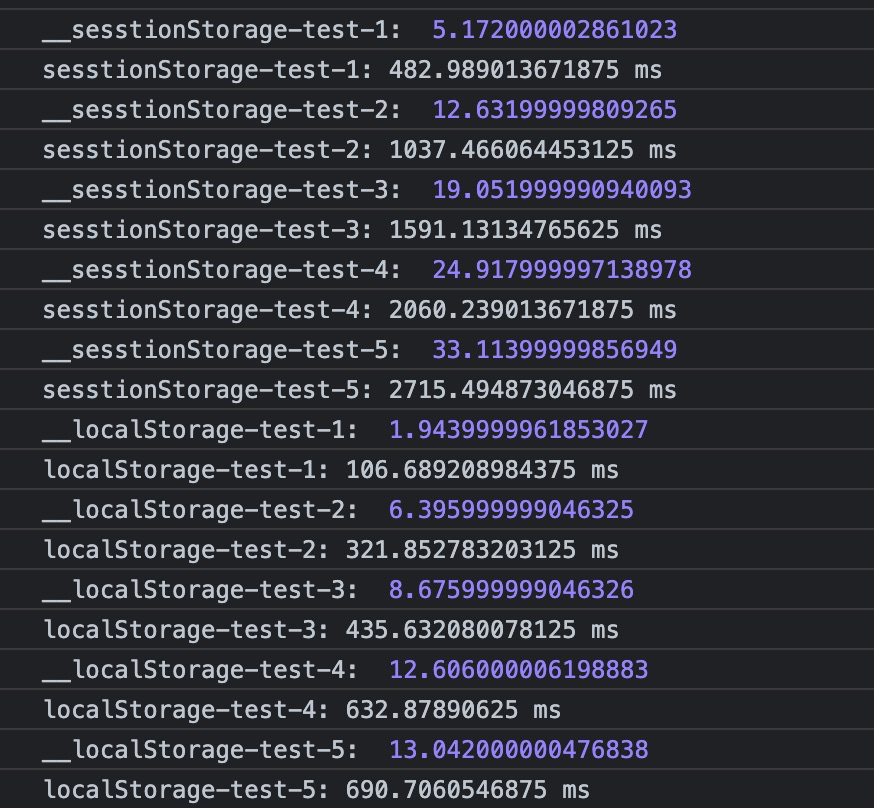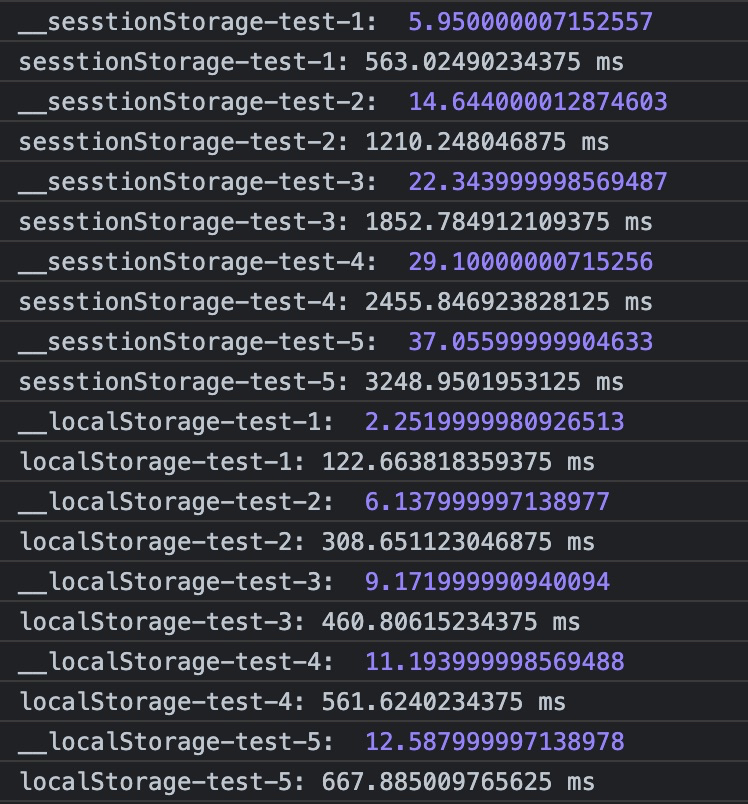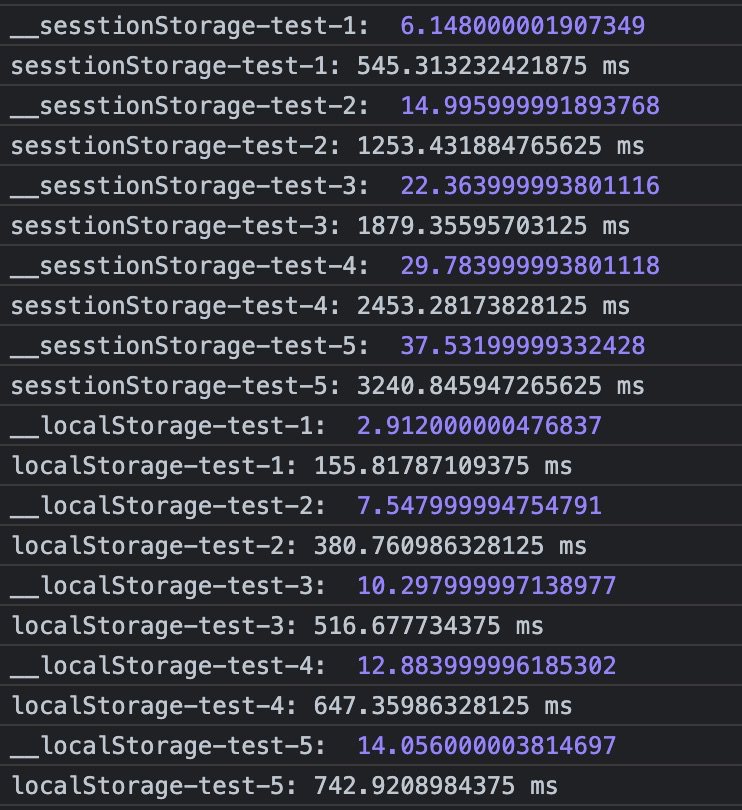@isq/storage
v1.0.2
Published
封装sessionStorage和localStorage操作
Downloads
3
Maintainers
Readme
Storage:对sessionStorage和localStorage操作进行封装
解决的问题
平常我们在浏览器存储数据时需要通过localStorage和sessionStorage两个对象来操作,如果我们希望限制存储到localStorage和sessionStorage的数据是有时效的,将需要一些额外的工作量,这个库就是用来解决这两个问题的。
功能介绍
- 可以对存储到localStorage和sessionStorage的数据设置有效期。
- expire参数接受number、string、date,实际上就是接受相对时间和绝对时间。
- 如果expire参数为number、date类型,那么认为传入的时间是数据过期的时间,例如:如果传入new Date(2021, 7, 8, 10, 10),如果当前时间大于这个时间,则认为数据已过期,会返回默认值(可自定义,默认为null)。
- 如果expire参数为string类型,符合
/^(\d+)([dhms]{1,1})$/i格式则认为是相对时间,内部会进行处理,转化为绝对时间,d - 天、h - 小时、m - 分钟、 s - 秒(dhms忽略大小写),不符合该时间的一律认为是绝对时间,会用date对象处理,因此传入string类型的绝对时间,需要符合date对象格式,如果string使用date对象转化出错,将会抛出异常。 - 默认暴露Storage实例可以直接使用,自定义实例接受一个配置对象,配置对象有type、prefix和expire三个属性,分别表示使用实例如果未传入type参数,默认使用localStorage还是sessionStorage存储数据、获取数据和清除数据;Storage实例配置:type - session、prefix - '_storage'、expire - 0(表示没有过期时间)。
prefix配置说明:是为了区分通过storage库存储的数据和其他操作存储的数据,至于为什么要区分,有两点原因:一是:如果多人合作在同一个域下都有存储数据,为了防止与别人的键冲突;二是:查看或者定位问题的时候,易于区分哪些数据是通过storage库处理的;
数据有效时间说明:库是在取值的时候校验数据有效性,如果发现过期,将会异步清除数据,不要以为库会定时去清理过期的数据,因此不要存入太多过大、存储时间长、使用频率较低的数据
快速上手
import { Storage, WebStorage } from '@isq/storage';
// 异步操作
Storage.setItem('test', { name: 'storage', age: 1 }).then((data) => {
console.log('setItem success!');
// 存储数据失败处理
}).catch(err => {
console.error('setItem fail!');
// 存储数据成功处理
})
// 同步操作
const result = Storage.setItemSync('test', { name: 'storage', age: 1 });
if (result) {
console.log('setItem success!');
// 存储数据失败处理
} else {
console.error('setItem fail!');
// 存储数据成功处理
}
// 自定义自己的实例
const MyStorage = new WebStorage ({
prefix: '__myPrefix_',
type: 'local',
expire: '10m'
});
MyStorage.setItem('myKey', { name: 'my' }, { expire: '3d' });
暴露接口
接口有两套,一套异步接口,一套同步接口,异步接口返回的是promise,暴露异步接口的原因:主要是为了让js线程做它更应该做的事情,详情可以见最后的内容。
参数说明
declare enum StorageType {
Local = "local",
Session = "session"
}
interface StorageOptions {
type?: StorageType,
expire?: string | number | Date,
}所有方法的opts参数都是StorageOptions类型,StorageType枚举值中local表示localStorage、session表示sessionStorage;expire意思表示数据什么时候到期,因此如传入number和date实例,需要自己计算值的过期时间
创建自己的实例 示例如下
import { WebStorage } from '@isq/storage';
const MyStorage = new WebStorage({
prefix: '__my_storage_',
expire: '10m',
local: 'local'
})无论是自己义实例还是内部暴露出来的Storage实例,都有以下方法
同步接口
setItemSync(key, value, [opts]):对应sessionStorage和localStorage的setItem,只是可以添加opts参数,通过传入type和expire参数自定义存储行为
getItemSync(key, [defVal], [opts]):对应sessionStorage和localStorage的getItem,因为存入本地存储和会话存储的数据具有时效,因此当数据过期时,可以传入一个默认值,进行兜底,防止后面的逻辑出错;如果没有传入,默认返回null;还可以添加opts参数,通过传入参数type自定义取值行为
clearSync([opts]):对应sessionStorage和localStorage的clear,只是可以添加opts参数,通过传入参数type自定义清除行为
异步接口
setItem(key, value, [opts]):内部调用的是setItemSync,使用Promise封装了一下,返回Promise
getItem(key, [defVal], [opts]):内部调用的是getItemSync,使用Promise封装了一下,返回Promise
clear([opts]): 内部调用的是clearSync,使用Promise封装了一下,返回Promise
额外话题
网上有说往sessionStorage和localStorage读写写大量数据时,会有性能问题;个人觉得往sessionStorage和localStorage读写数据的时间基本可以忽略,至于有没有性能问题,直接看数据吧:



上面三张图表示对localStorage和sessionStorage写入1-5M数据50次的结果,带有__前缀的表示这五十次的平均值,没有前缀的表示这50写操作的总耗时,后面的数字表示写入数据的大小,可以看出写入5m数据也仅仅30ms左右,这对用户来说几乎无感知,而localStorage和sessionStorage能存储数据的大小也就5M左右,所以几乎不用担心读写数据性能问题;
这里只做了写数据测试,没有做读数据测试,个人觉得应该都差不多,有兴趣的可以去验证一下,读测试代码在库的storageTest目录下,可以拉下去改改就能测试读性能测试了;建议使用performanced对象来计算时间,精确性比console.time高。
